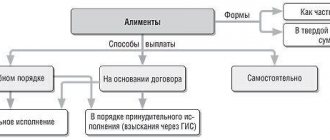Responsibilities for maintaining the wife, whether the couple is divorced or married, are imposed by the relevant articles of the Family Code of the Russian Federation. In this case, the amount of alimony for the maintenance of a spouse after divorce can be determined either by a mutually beneficial agreement, certified by a notary, or in the process of a court decision. The process of calculating maintenance and canceling alimony is considered in each individual case, based on the financial situation of the parties, ability to work and other factors.
Attention!
- Most cases regarding alimony are extremely individual and consist of a very large number of factors.
- Understanding the legal framework is desirable, but it cannot guarantee a solution to your specific situation.
Alimony for wife: grounds for collection
Recall the basic principles and grounds for collecting alimony for an ex-wife and mother of a child. The grounds for collecting alimony are:
- Spouse's pregnancy;
- Raising a child under three years of age;
- Disability acquired during marriage or within a year after divorce.
In all the above circumstances, a woman is simply not able to provide for herself or get a job, since she needs to restore her health and care for a newborn or young child. In addition, alimony for the maintenance of the wife is extended if she is caring for a disabled child.
Articles on the topic (click to view)
- What are the consequences of not paying child support in 2020?
- Assignment of the right to claim under alimony obligations is possible
- Formula for calculating penalties and fines for alimony: sample
- Criminal liability for non-payment of alimony under Art. 157 of the Criminal Code of the Russian Federation
- Is alimony from financial assistance withheld for vacation?
- Find out the debt by name from the bailiffs for alimony
- Reducing alimony debt over the past period
The obligation of spouses (including former spouses) to help each other financially is enshrined in the Family Code of the Russian Federation (Articles 89-90).
However, we should not forget that our society is not devoid of selfish women who are ready to use any tricks in order to “sit at home” and do nothing. It is in this case that a man may be able to get away from alimony if he proves the illegality of collecting it.
Give me pills for greed!
In between conversations with her ex-husband, his ex-wife wrote down the man with all sorts of writings, giving the lawyers money that would be enough for textbooks and bicycles for the boy.
And since normal lawyers immediately warned that there was no chance of anything beyond her, the case was conducted by a rabble of loudmouths and other “deciders,” which I already wrote about in the post “Types of Lawyers: A View from the Court.” She lost already hopeless cases, spent money to no avail.
In the end, I decided to go all in: I simply physically limited the communication between the guy and the father. I persuaded my mother and sister (who are also... ahem... gifted) to write complaints to the guardianship that Nikolai swears in front of his son, watched bad videos in front of him, drinks and all that.
The guardianship didn’t really believe it, but in order to force the mother not to interfere with seeing the child, she had to go to court. And this is 3-4 months for all the hard work.
And the war began. I won’t go into details, they are too disgusting and completely destroy the faith in the majority of women, to whom “the assholes don’t pay alimony.” The procedure for communicating with the child was established taking into account Nikolai’s interests, but the lady was in no hurry to carry out the decision - the bailiffs, district police officers and other nonsense began. She was fined, she again went to the village with the boy, skipping school for him, she was fined again.
On the way out, Nikolai freaked out and quit all his jobs, fussing with a certificate for health reasons. My back was already depressed, my vision was a little weak. You can't work as a welder anymore.
I joined the stock exchange at the Central Signatory. The exchange would have found him a welder right away - but a reference... As a result, they can’t find a vacancy for him at his level of pay - it’s a province, and the guy is sitting on a maximum allowance of 4800 rubles.
And alimony from him... 4800 * 25% = 1200 rubles per month. Everything.
Gifts, things and other help also stopped - the mother went out into the wild frost, did not open the door, did not let him near her son. The freebie is over. Nikolai fiercely missed his son, but such a step was necessary - either to win back his child or to be a second-rate cash cow all his life.
How to legally avoid alimony for your ex-wife?
For the luck of men who want to get away from alimony for the maintenance of their wife, the Family Code contains an exhaustive list of legal grounds for removing obligations to their spouse. Their list includes the following circumstances:
- The wife's incapacity for work or disability of group 1 or 2 occurred as a result of: Her commission of a crime;
- As a result of alcoholic or drug intoxication;
- Failure to carry out the actions prescribed by the instructions, resulting in injury.
- Infidelity, neglect of marital fidelity;
If a man decides to get away from alimony legally through the court, he must be prepared for the fact that the court considers each case individually and can evaluate the marital relationship differently.
Can a court cancel alimony for a wife?
Good evening, Alexander.
This is important to know: Minimum salary for alimony
The loan will remain with the one who keeps the car. You can split the loan, in which case you will have to share the car... there are nuances there. I don't go into them. You write credit to yourself in your layouts. Why? Are you planning to keep the car? sell. pay off the loan.. cut costs.
Alimony for the maintenance of a wife (ex-wife) is collected only if the alimony payer has the necessary funds to provide it. So, for example, if the alimony payer has an income less than or equal to the subsistence minimum, then it is obvious that he will not be able to provide the other spouse with money. Collection of alimony in this case is unacceptable, since it will lead to the impossibility of the existence of the person obligated to pay alimony.
The amount of alimony exacted from a wife (ex-wife) in court is determined by the court based on the financial and marital status of the spouses (former spouses) and other noteworthy interests of the parties in a fixed sum of money payable monthly. At the same time, taking into account the financial situation of the parties involves comparing the level of income of the recipient and the alimony payer.
When determining the marital status of the alimony payer, only persons to whom he is legally obligated to provide maintenance are taken into account.
The court may release the spouse from the obligation to support another disabled spouse in need of assistance or limit this obligation to a certain period both during the marriage and after its dissolution.:
in the event that the incapacity for work of the wife in need of help resulted from the abuse of alcoholic beverages, drugs or as a result of her committing an intentional crime;
if the spouses are married for a short period of time;
in case of unworthy behavior of the wife in the family.
There is a chance. the size of the chances is difficult to guess at the moment. Need more information.
Yes, you can ask the court to reduce the amount of alimony due to your difficult financial situation. At the same time, it is not a fact that the amount of alimony for the spouse will also be about 7 thousand rubles.
Article 91 of the Family Code. The amount of alimony collected from spouses and former spouses in court
In the absence of an agreement between the spouses (former spouses) on the payment of alimony, the amount of alimony exacted from the spouse (former spouse) in court is determined by the court based on the financial and marital status of the spouses (former spouses) and other noteworthy interests of the parties in a fixed monetary amount, payable monthly.
Article 119 of the Family Code. Changing the amount of alimony established by the court and exemption from paying alimony
1. If, in the absence of an agreement on the payment of alimony, after the amount of alimony has been established in court, the financial or marital status of one of the parties has changed, the court has the right, at the request of either party, to change the established amount of alimony or to exempt the person obliged to pay alimony from paying it. When changing the amount of alimony or when releasing it from payment, the court also has the right to take into account other noteworthy interests of the parties.
In addition, since the loan was taken out during marriage, the debts can also be divided in half in accordance with Article 39 of the Family Code of the Russian Federation and the spouse can be obliged to pay half of the payment on the loan debt every month.
Article 39. Determination of shares when dividing the common property of spouses
1. When dividing the common property of spouses and determining shares in this property, the shares of the spouses are recognized as equal, unless otherwise provided by the agreement between the spouses.
2. The court has the right to deviate from the beginning of equality of shares of spouses in their common property based on the interests of minor children and (or) based on the noteworthy interests of one of the spouses, in particular, in cases where the other spouse did not receive income for unjustified reasons or spent the common property of the spouses to the detriment of the interests of the family.
3. When dividing the common property of the spouses, the common debts of the spouses are distributed between the spouses in proportion to the shares awarded to them.
Among other things, you and your spouse can enter into a written notarial agreement on the payment of alimony and agree on a monthly payment of a certain amount, which will not be an invoice for you - Chapter 16 of the Family Code of the Russian Federation - https://www.consultant.ru/popular/family/ 20_20.html#p825
1. The court can cancel alimony only on the basis of Art. 92 of the Family Code of the Russian Federation.
Article 92. Release of a spouse from the obligation to support the other spouse or limitation of this obligation for a period
This is important to know: Statement of claim for the recovery of alimony for the maintenance of a parent: sample
The court may release the spouse from the obligation to support another disabled spouse in need of assistance or limit this obligation to a certain period both during the marriage and after its dissolution:
in the event that the incapacity for work of the spouse in need of assistance occurred as a result of the abuse of alcoholic beverages, drugs or as a result of his commission of an intentional crime;
if the spouses are married for a short period of time;
in case of unworthy behavior in the family of a spouse requiring payment of alimony.
If in your case there are no such grounds, then it is better for you to agree with at least some amount of alimony for your spouse to show that you are not against it, but the requested amount is very large for you. For example. within 3-4 thousand rubles. those. YOU SHOULD ASK THE COURT FOR A REDUCTION OF THE AMOUNT according to Art. 91 of the Family Code of the Russian Federation: the amount of alimony exacted from a spouse (former spouse) in court is determined by the court based on the financial and marital status of the spouses (former spouses) and other noteworthy interests of the parties in a fixed sum of money payable monthly.
2. Since your child is less than a year old, then, according to Article 17 of the Family Code of the Russian Federation, the husband does not have the right, without the consent of his wife, to initiate proceedings for divorce during the wife’s pregnancy and within a year after the birth of the child. PLEASE TAKE THIS POINT ALSO IN CONSIDERATION.
3. While you have not yet had a division of property, I would like to draw your attention to the following:
-if the car is registered in your name and you use it, then the court on the basis of Art. 38 of the Family Code of the Russian Federation... has the right to leave it to you, but you will be obliged to pay your ex-wife (if you divorce) monetary compensation in the amount of half of the market value of the car at the time of division of property.;
— as for the loan, there is a nuance here: if it is spent on family needs (and there is written evidence of this), then you have the right to ask the court to recover half of the loan you paid for the period from the moment of divorce or termination of family relationships. You will not be able to transfer a debt or part of a debt without the consent of the bank according to Art. 391 Civil Code of the Russian Federation.
I am telling you the judicial practice that I constantly encounter.
I would be grateful for your positive feedback.
Amount of alimony payments in 2020
The amount of alimony for spousal support can be established by mutual agreement of the parties, as well as the timing of payments.
If the spouses cannot reach an agreement, then these issues must be resolved in court. The court takes into account several factors, among which one of the decisive ones is the size of the subsistence minimum (LS) in 2020. In most constituent entities of the Russian Federation, this indicator is officially recorded, but if the PM is not determined, then the all-Russian minimum is applied.
Attention! The amount of payments in favor of the spouse is calculated in parts of the subsistence level.
Reasons for changing the amount of payments
The law allows for the possibility of challenging the amount of alimony - reducing the amount or increasing it.
In this case, the court must take into account certain circumstances:
- What are the sources of income for each spouse?
- Does the man have financial obligations to other family members, including his parents?
- Is the income of each party stable, how high is the risk of complete loss of income.
- Are there factors that can reduce the income level of the husband and/or wife?
- Does each spouse's income meet their needs?
- Are each party supported by other relatives?
- Other circumstances that may influence the court’s conclusion on the amount of alimony.
Grounds for stopping payment of alimony
Depending on the reasons that led to the establishment of the obligation to pay alimony in favor of the ex-wife, a man can also get rid of this need.
To do this, you will have to provide the court with evidence that serves as the basis for refusing payments:
- The woman entered into a new marriage.
- The mother of our common children returned from maternity leave and started working again.
- The children have reached the age of 3 years, while the woman is able to work.
- Circumstances of a different kind that prove the financial viability of the ex-wife.
- Death of one of the parties.
It is also worth remembering that alimony obligations are not imposed on those men who do not have a sufficient level of income.
If the ex-husband does not work or is employed unofficially, the trial is carried out in a special manner. In such a situation, a woman is not always able to bill her husband for her maintenance.
Attention! Due to recent changes in legislation, the legal information in this article may be out of date! Our lawyer can advise you free of charge - write your question in the form below:
Did you like the article? Share the link with your friends:
Cancellation of alimony for the maintenance of the ex-wife
Responsibilities for maintaining the wife, whether the couple is divorced or married, are imposed by the relevant articles of the Family Code of the Russian Federation. In this case, the amount of alimony for the maintenance of a spouse after divorce can be determined either by a mutually beneficial agreement, certified by a notary, or in the process of a court decision. The process of calculating maintenance and canceling alimony is considered in each individual case, based on the financial situation of the parties, ability to work and other factors.
- Most cases regarding alimony are extremely individual and consist of a very large number of factors.
- Understanding the legal framework is desirable, but it cannot guarantee a solution to your specific situation.
Therefore, you can check any information with our on-duty legal consultants 24/7 and free of charge.
You can contact them in the following ways:
1) in online chat or through the form below
2) Or call the 24-hour hotline by phone: Moscow: St. Petersburg: For other regions: – the call is free from anywhere in Russia.
In what situations is alimony calculated for the maintenance of a former spouse?
Chapter 14, Section 5 of the RF IC specifies situations in which the husband is required to provide financial assistance for his ex-wife related to:
- Maintenance of the spouse for the entire period of pregnancy and for three years after the birth of a joint child;
- The extreme need in which the ex-wife finds herself raising a disabled child together;
- The disability of a divorced spouse, which does not allow her to work while raising children until they reach the age of 18.
Only a court can accurately determine the criteria for the neediness of an ex-wife, taking into account the financial condition of both spouses and the ability to raise joint children. Even if the mother has a job that does not greatly affect her material well-being and covers only daily needs, the court can award the ex-husband payment of alimony.
Alcoholism and drug addiction
The theory classifies these pathological conditions as diseases. But practice shows that a person acquires these diseases solely of his own free will. No coercion.
A drinking mother is a mother only in those “bright” periods of life when her consciousness is not clouded by alcohol or drugs. Providing financial support to an alcoholic or drug addict after a divorce means sponsoring her addiction.
Considering the negative attitude towards people who are unable to cope with these addictions, the court considers them worthy of attention and releases the ex-husband from alimony obligations.
How to deprive your ex-wife of alimony?
The situation when ex-wives abuse their legal rights is not uncommon, and divorced husbands have to pay alimony to their ex-spouses until their common children reach the age of 18. Often, mothers have completely stable jobs and do not need anything. The cancellation of alimony for the maintenance of the mother of common children is carried out in the same way as the accrual - by joint agreement, or by court decision. Situations that may serve as reasons for canceling alimony payments are prescribed in some articles of the RF IC and are partially advisory in nature, since the husband filing the claim will be required to have strong evidence of the occurrence of a particular situation in the life of the mother of their common children:
- If the former spouse’s incapacity for work occurred as a result of abuse of alcoholic beverages, narcotic substances, or the commission of an intentional serious crime that resulted in a prison sentence - Article 92 of the RF IC;
- If the marriage did not last long, this parameter is subjective and, most often, is accepted in the amount of up to 3 years, but is considered individually at a court hearing - Art. 92 of the RF IC;
- Remarriage of a needy spouse, resulting in a change in the level of material well-being and the transfer of the responsibility for maintaining the woman to a new husband - Article 119 of the RF IC;
- If the financial situation of a spouse who was on maternity leave but returned to work improves, documentary evidence is required that the ex-wife can fulfill the obligations to support herself and the child in the relevant parts - Article 119 of the RF IC;
- In the case of deliberate and proven illegal actions of the ex-wife, who provided false data about her financial situation, or in the commission of a crime against the ex-husband - Art. 119 of the RF IC.
This is important to know: Is it possible to apply for alimony if you were not married?
Misbehavior
Anachronism in the legislative system. The concept of “dignity” has undergone such dramatic changes since the entry into force of the IC that it will be extremely difficult to prove this motive to the court. It’s difficult to even think of what this or that husband might consider unworthy, with the exception of a far-fetched idea to get rid of her.
If you declare infidelity in marriage, then this smacks of “sexism”, in its modern understanding, restriction of a woman in the manifestation of her individuality and sexual freedom, therefore this fact is not considered sufficient in court.
How can I deprive my ex-wife of alimony in court?
Cancellation of alimony for the maintenance of a spouse is carried out in court, unless otherwise specified in the alimony agreement, upon presentation of significant evidence from the plaintiff. Given that the court is always on the side of the mother when resolving various alimony disputes, there is a real chance of canceling alimony for the maintenance of the spouse if her financial situation changes or the period of incapacity ends. To do this, it is necessary to provide the court with evidence that maintaining the spouse is no longer the responsibility of the divorced husband. There may be several such situations:
- A change in the financial situation of the former spouse, which does not allow the payment of alimony to the former spouse, either as a percentage of income or in hard cash;
- Cancellation of alimony due to the marriage of an ex-wife - even unregistered residence with a partner for a long time with confirmation of witnesses is considered;
- In cases where the ex-wife found a permanent job and worked there for at least one month or is registered on a permanent basis, this may be the basis for canceling alimony if the income received allows the spouse to support herself and fulfill the obligations of raising a child;
- When illegal actions and inappropriate behavior are confirmed by numerous eyewitness accounts and law enforcement agencies, guardianship services and juvenile affairs, the alimony is canceled by the court, up to the deprivation of the mother’s parental rights.








